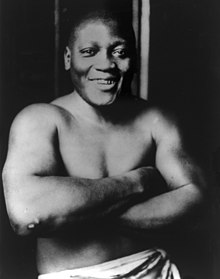
Back جاك جونسون (ملاكم) Arabic جاك جونسون ARZ Jack Johnson (boxer) Czech Jack Johnson (bokser) Danish Jack Johnson (Boxer) German Τζακ Τζόνσον (πυγμάχος) Greek Jack Johnson Esperanto Jack Johnson (boxeador) Spanish Jack Johnson Estonian جک جانسون Persian
Jack Johnson | |
|---|---|
 Johnson in 1915 | |
| Born | John Arthur Johnson March 31, 1878 Galveston, Texas, U.S. |
| Died | June 10, 1946 (aged 68) |
| Other names | Galveston Giant[1] |
| Statistics | |
| Weight(s) | Heavyweight[1] |
| Height | 6 ft 0+1⁄2 in (1.84 m)[2][3] |
| Reach | 74 in (188 cm)[1] |
| Stance | Orthodox |
| Boxing record | |
| Total fights | 94 |
| Wins | 68 |
| Wins by KO | 34 |
| Losses | 11 |
| Draws | 11 |
| No contests | 4 |
| Signature | |
 | |
John Arthur Johnson (March 31, 1878 – June 10, 1946), nicknamed the "Galveston Giant", was an American boxer who, at the height of the Jim Crow era, became the first black world heavyweight boxing champion (1908–1915). His 1910 fight against James J. Jeffries was dubbed the "fight of the century".[4] Johnson defeated Jeffries, who was white, triggering dozens of race riots across the U.S. According to filmmaker Ken Burns, "for more than thirteen years, Jack Johnson was the most famous and the most notorious African American on Earth".[5][6] He is widely regarded as one of the most influential boxers in history. Transcending boxing, he became part of the culture and history of racism in the United States.[7]
In 1912, Johnson opened a successful and luxurious "black and tan" (desegregated) restaurant and nightclub, which in part was run by his wife, a white woman. Major newspapers of the time soon claimed that Johnson was attacked by the government only after he became famous as a black man married to a white woman, and was linked to other white women.[8] Johnson was arrested on charges of violating the Mann Act—forbidding one to transport a woman across state lines for "immoral purposes"—a racially motivated charge that embroiled him in controversy for his relationships, including marriages.[9] Sentenced to a year in prison, Johnson fled the country and fought boxing matches abroad for seven years until 1920, when he served his sentence at the federal penitentiary at Leavenworth.
Johnson continued taking paying fights for many years, and operated several other businesses, including lucrative endorsement deals. He died in a car crash in 1946 at the age of 68.[10] In 2018, Johnson was posthumously pardoned by U.S. President Donald Trump.[11]
- ^ a b c Ingming Duque Aberia (2009). Manny Pacquiao: The Greatest Boxer of All Time. Hermilando "Ingming" Aberia. p. 47. ISBN 9781449596989. Retrieved August 28, 2014.
- ^ "Jack Johnson the "Galveston Giant"". Boxing Hall of Fame. Archived from the original on September 3, 2014. Retrieved August 28, 2014.
- ^ "Jack Johnson". BoxRec.com. Retrieved October 27, 2021.
- ^ John L. Sullivan, cited in: Christopher James Shelton, Historian for The Boxing Amusement Park, "'Fight of the Century' Johnson vs. Jeffries, the 100th anniversary"
- ^ Ken Burns, Unforgivable Blackness [further explanation needed]
- ^ "Unforgivable Blackness. Sparring. Johnson's Rise". PBS. Retrieved September 30, 2014.
- ^ Cite error: The named reference
:0was invoked but never defined (see the help page). - ^ Johnson, Charles J. "The short, sad story of Cafe de Champion – Jack Johnson's mixed-race nightclub on Chicago's South Side". Chicago Tribune. Retrieved May 27, 2018.
- ^ Pascoe, Peggy (2009). What Comes Naturally: Miscegenation Law and the Making of Race in America. Oxford, England: Oxford University Press. pp. 164–165. ISBN 978-0-19-509463-3. OCLC 221155113.
- ^ "U.S. News & World Report 'Two champs meet'". Internet Archive. Archived from the original on November 11, 2013. Retrieved February 14, 2015.
- ^ Eligon, John; Shear, Michael D. (May 24, 2018). "Trump Pardons Jack Johnson, Heavyweight Boxing Champion (Published 2018)". The New York Times. ISSN 0362-4331. Retrieved February 25, 2021.